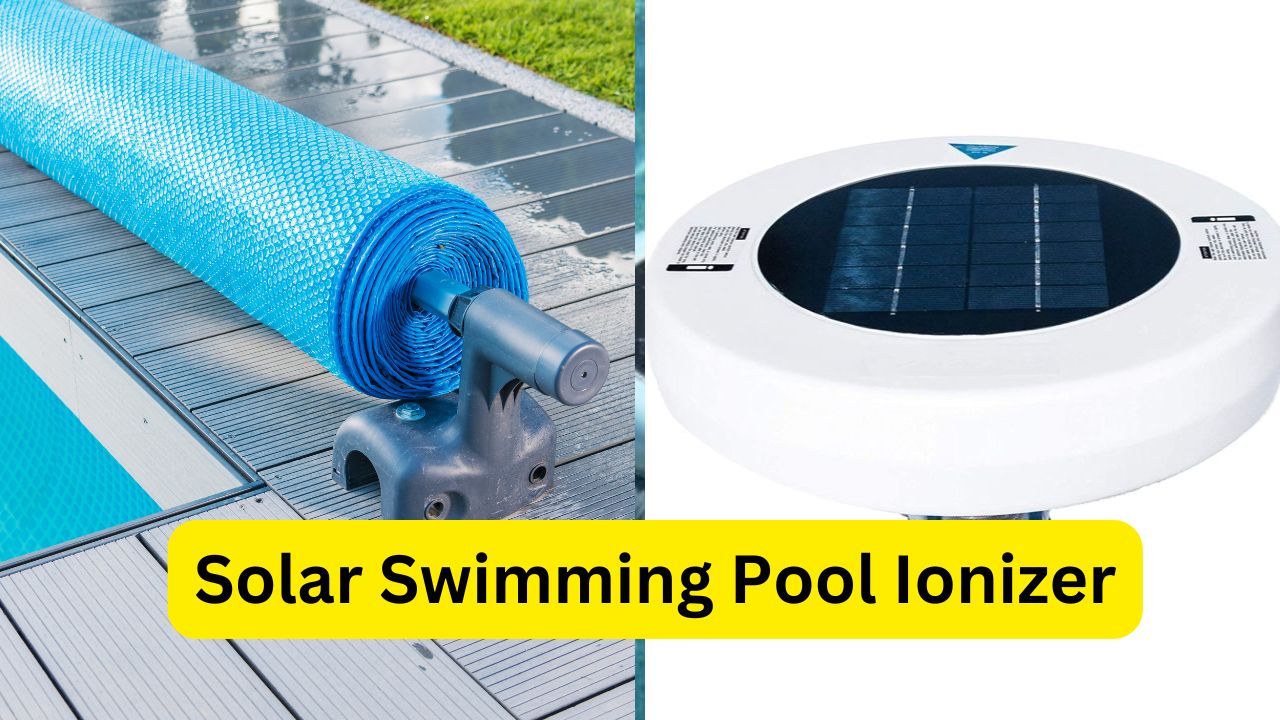Maintaining a clean and clear swimming pool can be a challenge, especially when it comes to balancing chemicals and keeping harmful bacteria at bay. A solar pool ionizer offers a unique, eco-friendly solution to this problem Using the power of the sun to generate ions that keep your pool water sanitized. If you’ve been looking for alternatives to traditional chlorine-based treatments, you may have heard about this technology. But is a solar pool ionizer the right choice for you?
In this article, we’ll take an in-depth look at solar pool ionizers, their advantages and disadvantages, and whether they are a good fit for your swimming pool maintenance routine.
What Is a Solar Swimming Pool Ionizer?
A solar swimming pool ionizer is a device that uses solar energy to release ions—typically copper and sometimes silver—into the water. These ions help to kill algae and bacteria, reducing the need for large amounts of chlorine or other chemicals. The ionizer consists of a solar panel that powers the ionization process and a metallic anode (usually made from copper or a copper-silver alloy) that slowly dissolves into the water to release the ions.
How It Works Solar Swimming Pool Ionizer?
- Solar Power Generation: The device sits on the surface of your pool and uses sunlight to generate electricity through its built-in solar panel.
- Ion Release: The electrical current from the solar panel passes through the anode, causing it to release copper or silver ions into the water. These ions work to eliminate algae, bacteria, and other microorganisms.
- Reduction of Chlorine: The ions actively sanitize the water, allowing you to reduce the amount of chlorine or other chemicals you need to use. However, solar ionizers are not a complete replacement for chlorine—they act as a supplement to traditional pool chemicals.
Types of Ions Used
- Copper Ions: These are the most common and are effective at preventing algae growth.
- Silver Ions: Sometimes used in conjunction with copper, silver ions are known for their antibacterial properties.
Pros of Using a Solar Pool Ionizer
1. Energy Efficient
One of the biggest advantages of a solar pool ionizer is its reliance on renewable energy. Since the device uses solar power, it doesn’t consume electricity from the grid, making it an energy-efficient option. By harnessing the power of the sun, you’re not only saving on energy bills but also reducing your carbon footprint.
2. Reduces Chemical Usage
Traditional pool treatments often rely heavily on chlorine, which can be harsh on your skin, eyes, and hair. A solar pool ionizer helps reduce the need for chlorine by keeping algae and bacteria under control through the use of copper and silver ions. Many pool owners find that they need significantly less chlorine when using an ionizer, leading to softer water that is more pleasant to swim in.
3. Cost Savings Over Time
Although a solar pool ionizer may come with an upfront cost, it can save you money in the long run. The reduction in chemical usage means fewer trips to the store for chlorine, algaecides, and other pool chemicals. Additionally, since the device runs on solar energy, you won’t see an increase in your electricity bill.
4. Less Frequent Pool Maintenance
A solar ionizer can help reduce the amount of time you spend on pool maintenance. By keeping algae and bacteria levels down, the device helps maintain cleaner water for longer periods. This means fewer chemical balancing tasks, less frequent scrubbing, and a more enjoyable pool experience.
5. Healthier Swimming Environment
Swimming in a pool with lower chlorine levels can be much more comfortable for many people, especially those with sensitive skin or allergies. Chlorine can cause irritation, redness, and itching, but with the reduced need for it, you’ll likely notice that your pool water feels more gentle on your skin and eyes.
Cons of Using a Solar Pool Ionizer
1. Not a Complete Chlorine Replacement
Although a solar ionizer significantly reduces the need for chlorine, it is not a complete substitute. You will still need to maintain minimal chlorine levels to ensure that your pool remains fully sanitized. Some bacteria and viruses are resistant to ionization, so chlorine is still necessary to ensure overall water safety.
2. Limited in Extreme Conditions
Solar pool ionizers rely on sunlight to generate the electricity needed for ionization. This means that during cloudy days, or in locations with long periods of overcast weather, the device may not perform at its best. In these conditions, you might need to rely more on traditional chemical treatments to keep your pool clean.
3. Upfront Cost
While a solar pool ionizer can save you money in the long term, the initial cost of purchasing the device might be a drawback for some pool owners. Solar ionizers range in price, but they generally fall between $150 and $400, depending on the size of your pool and the quality of the ionizer.
4. Maintenance of the Anode
Over time, the anode inside the solar ionizer will wear down and need to be replaced. This is a standard part of maintenance, but it does mean that the device requires some upkeep. Replacing the anode usually isn’t a difficult or expensive task, but it is something to keep in mind when considering a solar ionizer.
5. Slow Reaction Time
Unlike chemical treatments, which can show results within hours, a solar pool ionizer works more gradually. It may take a few days to notice the effects, especially if your pool has a high algae load to begin with. This slower response time means that in cases of heavy contamination, a solar ionizer alone may not be enough to restore water quality quickly.
Is a Solar Pool Ionizer Right for You?
A solar swimming pool ionizer can be a great choice for pool owners who are looking for a more eco-friendly and cost-effective way to maintain their pools. If you’re trying to cut down on chemical usage and prefer a more natural approach to water treatment, a solar ionizer offers several appealing benefits. However, it’s important to recognize that a solar ionizer isn’t a one-stop solution. You will still need to use chlorine, albeit in smaller quantities, and you’ll need to keep up with the regular maintenance of the device.
Factors to Consider:
- Location: If you live in a sunny area, a solar ionizer will work more efficiently compared to regions with frequent cloudy weather.
- Pool Size: Larger pools may require more than one ionizer to achieve the best results.
- Budget: While the long-term savings are substantial, the upfront cost may require some consideration.
Conclusion
In solar pool ionizer offers an eco-friendly and low-maintenance way to keep your pool clean while reducing chemical usage. It’s particularly beneficial for those looking to minimize chlorine exposure and enjoy a healthier swimming experience. However, it’s not a full replacement for chlorine and works best in sunny climates. By weighing the pros and cons, you can decide if this technology is the right fit for your pool care routine.


